As data privacy regulations like GDPR, CCPA, and LGPD expand globally, website owners face mounting pressure to stay compliant. For small businesses and WordPress users with limited legal or technical expertise, navigating these complex laws can be overwhelming.
Simple cookie banners no longer cut it. Today, compliance demands deeper solutions: logging user consent, dynamically adapting to visitor locations, and providing legally sound policies. Missing a step could mean hefty fines or lost trust.
That’s where the WPLP Compliance Platform comes in handy. It’s a dual-plugin suite combining WP Legal Pages and WP Cookie Consent to automate compliance without the headache.
In this WPLP Compliance Platform review, we’ll discuss how it works, its standout features, and whether it’s the right fit for your WordPress site.
Quick Navigation
What Is the WPLP Compliance Platform?
The WPLP Compliance Platform is a WordPress plugin suite designed to help website owners stay compliant with global privacy regulations like GDPR, CCPA, LGPD, and the ePrivacy Directive. It combines two main tools: WP Legal Pages and WP Cookie Consent. With them, you can simplify legal compliance by generating essential legal documents and setting up cookie consent systems.
With just a few clicks, the platform lets you:
- Create privacy policies and other legal pages using customizable templates.
- Configure a cookie banner tailored to privacy laws and visitor locations.
- Log user consent, block third-party scripts before consent is given, and schedule cookie scans.
- Support IAB TCF 2.2, integrate with major WordPress page builders like Elementor and Divi, and even style the entire experience to match your branding.
WPLP adapts based on user location, tracks consent activity, and gives you the tools to meet serious compliance standards. It can save you a lot of money, as privacy law violations can result in fines of up to 20 million euros or 4% of annual revenue under GDPR.
Key Features of the WPLP Compliance Platform at a Glance
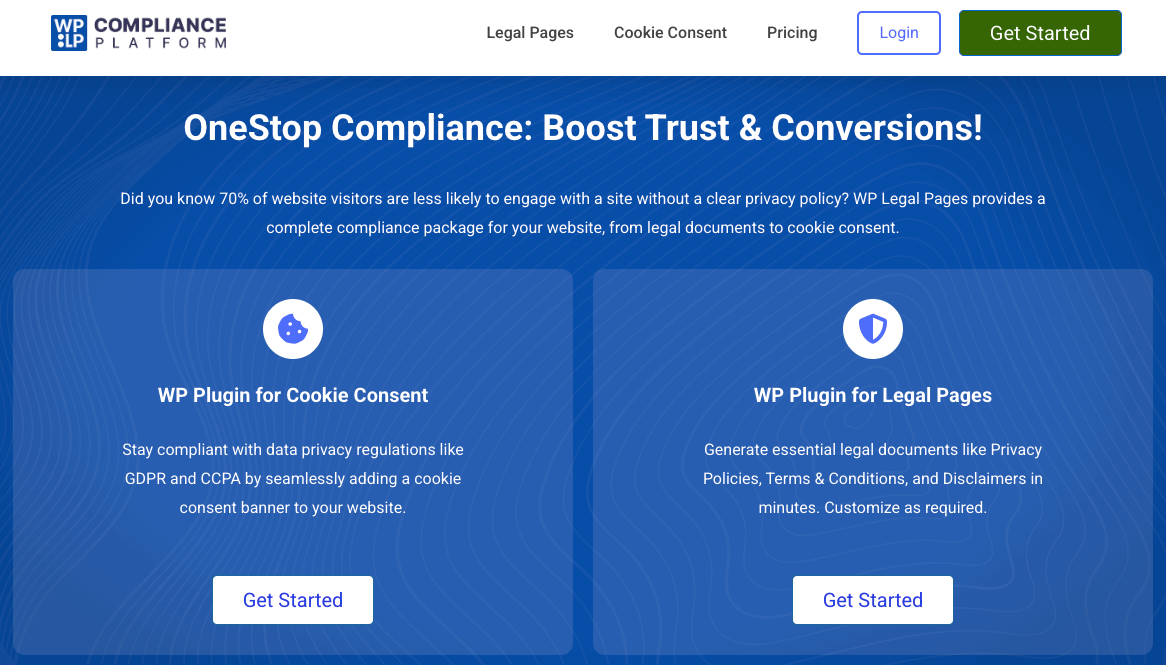
Whether you’re running one website or several, WPLP Compliance makes legal compliance far more accessible and practical for WordPress site owners. Together, the two included plugins give you everything you need for global privacy compliance without relying on multiple third-party tools. Let’s explore what you’ll get:
1. Legal Page Generator (WP Legal Pages)
WPLP includes a powerful legal page generator that allows users to create privacy policies, terms of service, disclaimers, and other essential legal documents with a single click. Here are the key features:
- One-click creation of privacy policies, terms, disclaimers, and more
- 21+ pre-built legal templates (4 in the free version)
- Customizable content with smart tags for dynamic data
- Seamless integration with WordPress pages
2. Cookie Consent Management (WP Cookie Consent)
You can create fully customizable cookie banners, pop-ups, or widgets that meet global compliance standards. The key features are as follows:
- Fully customizable cookie banners, popups, or widgets
- Consent logging and audit-ready history
- Script blocker to prevent third-party cookies from loading without consent
- Data request form via shortcode (for GDPR/CCPA compliance)
3. Global Compliance Coverage
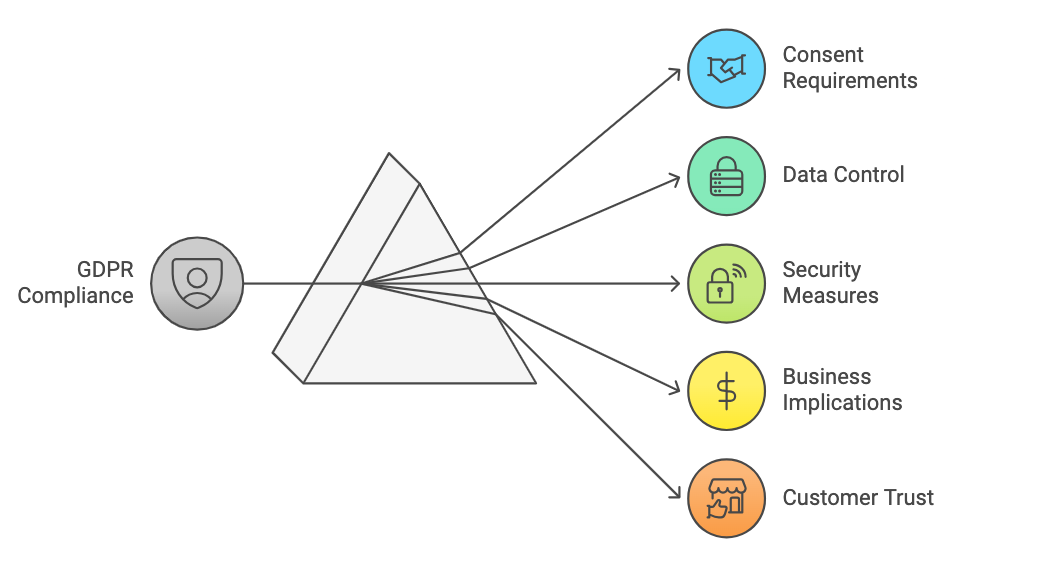
WPLP is designed to help websites comply with major privacy laws, including the GDPR, CCPA, LGPD, and the ePrivacy Directive. It supports geo-targeting, so you can display cookie banners only in regions where compliance is required. It also integrates with Google Consent Mode and supports the IAB TCF 2.2 framework.
4. Custom Branding and Styling
You can easily align the appearance of your legal tools with your website’s branding. The plugin allows the customization of cookie banners, including options to change colors, adjust opacity, set borders, and even upload your logo. It includes several pre-designed templates that can be applied with a single click.
5. Advanced Dashboard and Settings
The platform offers a centralized dashboard where you can track compliance status, review scan history, and monitor consent logs. Depending on your plan, you can scan up to 20,000 pages to identify cookies and scripts that need to be disclosed. Advanced settings also allow you to run A/B tests on different banner designs and configure language preferences for multilingual support.
6. Multi-Site Support
For users managing more than one site, WPLP offers multi-site support. You can manage compliance settings across multiple WordPress sites from a single dashboard. The Professional plan supports up to three sites, while the Business plan allows for up to ten.
7. WordPress Experience and Ease of Use
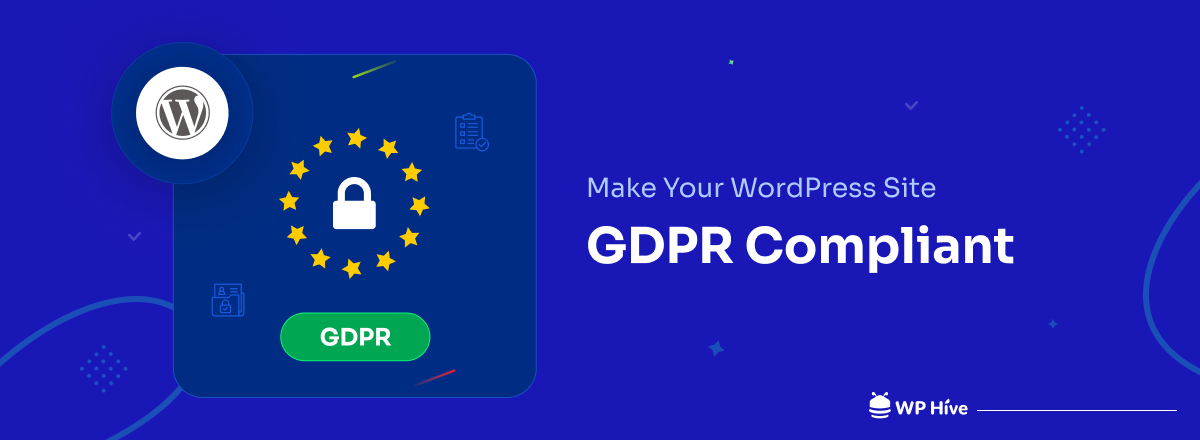
Setup is quick and intuitive. You can generate a full set of legal pages within minutes; no legal jargon or manual copy-pasting is needed. The cookie banner is also beginner-friendly, with customization options for text, layout, color, and display rules. We tested the plugin on our WordPress site. No theme conflicts or performance issues were observed.
Read more: 11 Proven Tips on How to Make Your WordPress Site GDPR Compliant
How to Set Up WPLP Compliance: A Walkthrough
Here’s a step by step walkthrough for how to set up WPLP Compliance on your WordPress site:
Step 1: Install and Activate the Plugin
To begin, go to your WordPress dashboard. Navigate to Plugins > Add New, then search for “WP Legal Pages” or “WP Cookie Consent” (both are components of the WPLP Compliance Platform). Click Install Now, and then Activate the plugin. If you’ve purchased a premium plan, upload the ZIP file directly via the “Upload Plugin” button.
Or you can visit the WPLP Compliance Platform website and create an account. You can start with a free plan or select a paid subscription for advanced features. After signing up, navigate to your account dashboard and download the two core plugins (WP Legal Pages and WP Cookie Consent).
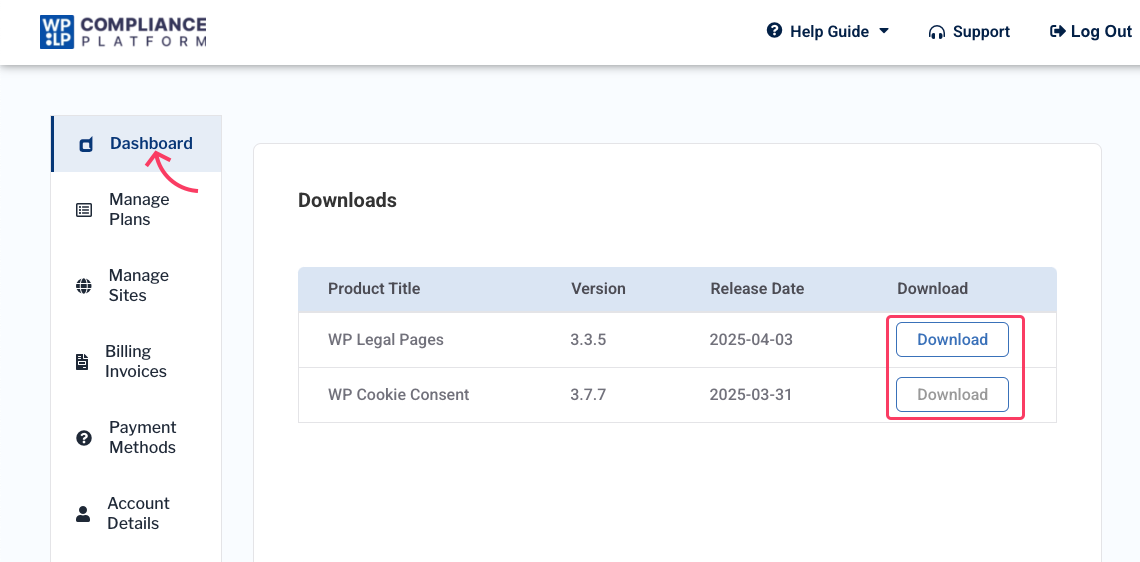
Then, upload the ZIP files using your WordPress dashboard. Upon successful installation and activation, you’ll get two additional menus in your admin panel designated for . Now configure the tools using these options.
Read more: How to Install a WordPress Plugin – Step by Step for Beginners
Step 2: Configure Legal Pages
Once the plugin is active, go to WP Legal Pages in your dashboard menu. Click on it and you’ll be taken to the plugin’s dashboard. This helps users manage their website’s legal policies and cookie consent settings from one single place.
A circular progress indicator shows that percentage of the tasks required for compliance have been completed. This gives a visual representation of how much work has been done so far.
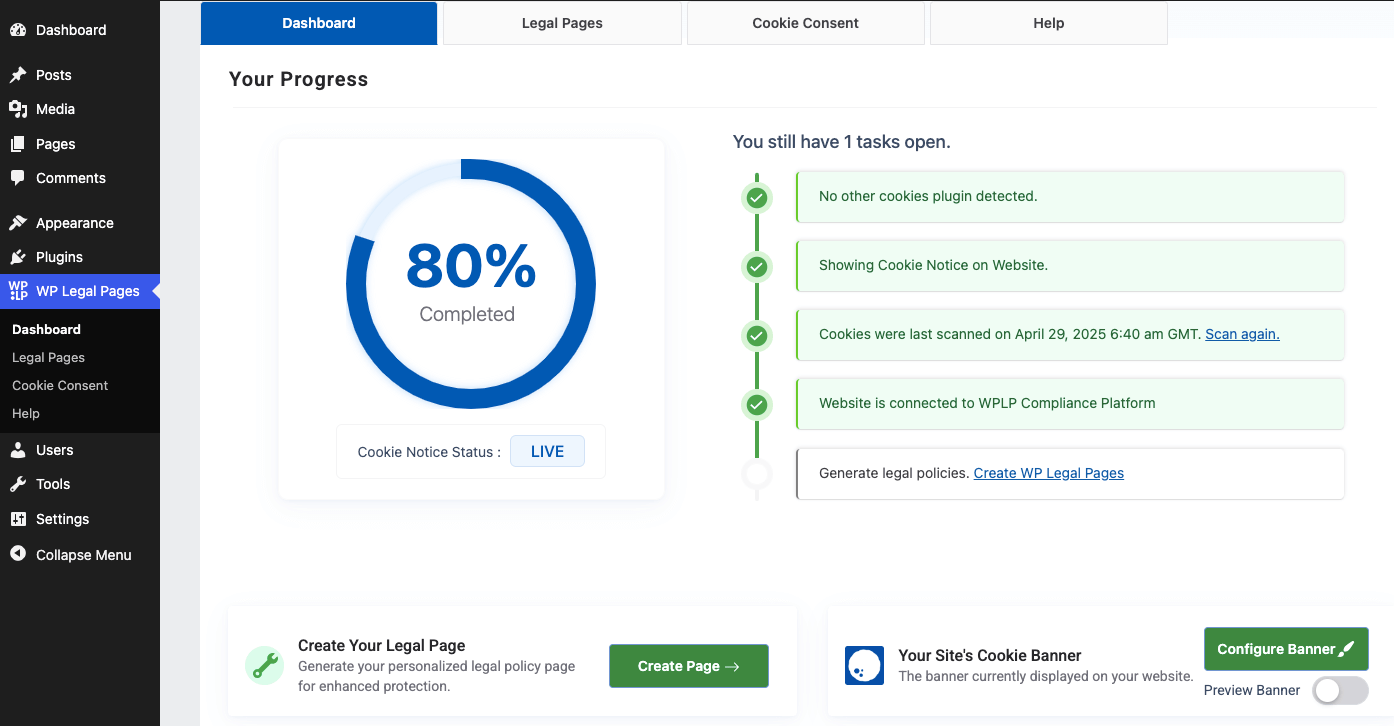
Cookie Notice Status: LIVE Indicates that the cookie notice is currently active on the website. This means visitors will see the cookie consent banner when they visit the site.
Scroll down to find more options. Click on the green button labeled “Create Page →” to generate personalized legal policy pages (e.g., Privacy Policy, Terms of Service) to enhance protection.
You can also configure your site’s cookie banner. Define how the banner displays information about the cookie banner currently shown on the website. Toggle the “Preview Banner” to view how the banner looks on the website.
If you scroll more, you’ll find more options on the dashboard.
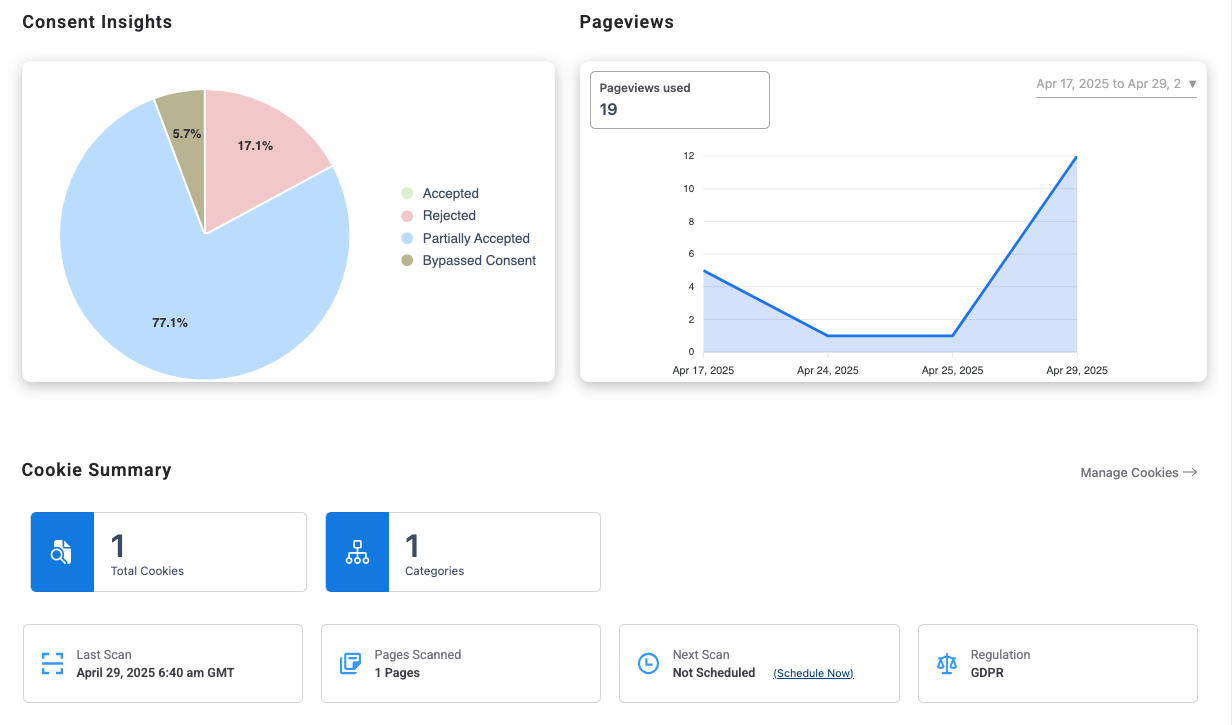
The “Content Insights” section provides a pie chart that illustrates how users interact with the cookie consent banner.
The “Pageviews” section tracks website traffic over time , and the “Cookie Summary” table outlines technical details, such as the tracking of cookie across categories, last scan and regulation type. You’ll also get all “Consent Logs” if you scroll more. You can export these logs as a CSV file and download individual log reports in PDF format.
Step 3: Create Your Required Legal Pages
Click on the “Create Legal Pages” to open the WPLegalPages Wizard. It offers a guided process to create legal pages for your website, with templates categorized into Policies, Disclosures, Disclaimers, and Other sections.
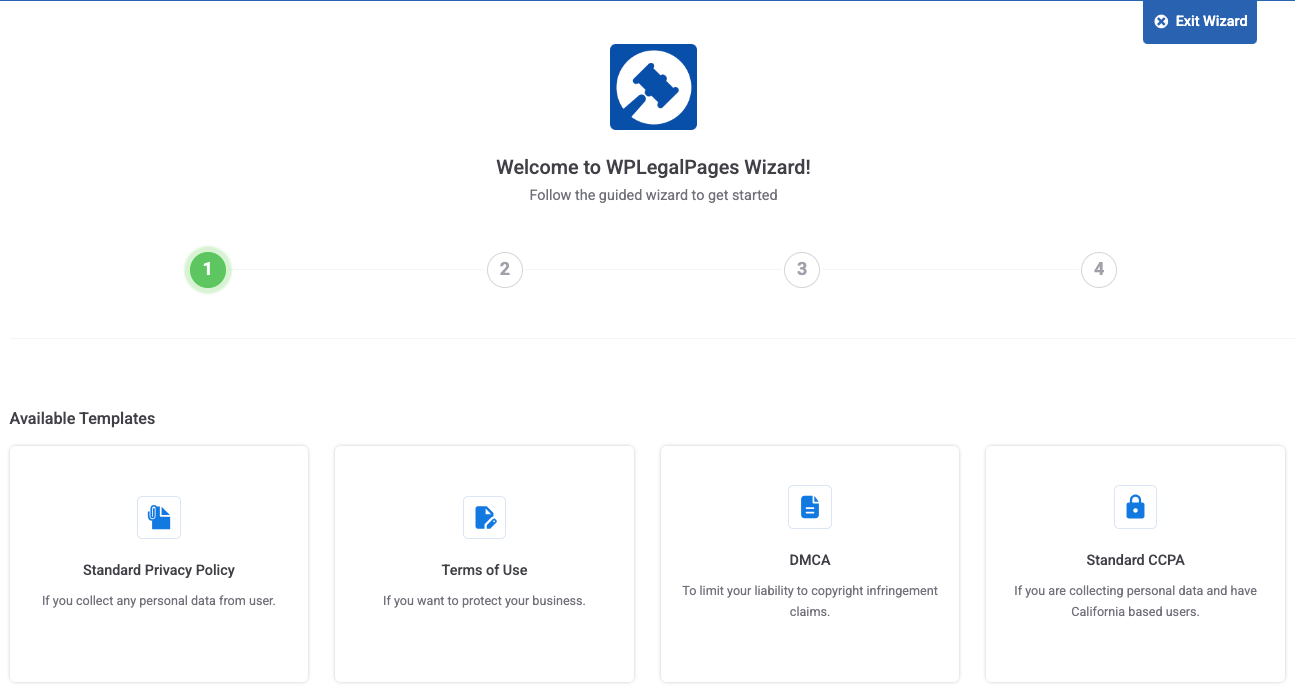
Policies include options like Privacy Policy, Terms of Use, Cookies Policy, and CCPA, ensuring protection for both users and businesses.
Disclosures cover Affiliate, Advertising, and Confidentiality Disclosures, promoting transparency in affiliate marketing and content ownership.
Disclaimers such as General, Medical, and Earnings Disclaimers help limit liability and inform users about the limitations of your content.
The Other category includes tools like Antispam, FTC Statements, and End User License Agreements (EULA) for broader legal needs. Choose any one from 35+ legal templates including the PRO templates. Then complete the following steps:
- Select a template.
- Click the “Create” button.
- Fill in your business details using the provided form.
- WPLP uses smart tags to auto-populate the content.
- Hit the Next button and click “Create and Edit“
Then you’ll be taken to the WordPress editor where you can edit your pages as per your requirements. Once ready, hit Publish to make the legal page live.
You can repeat this process to create additional legal pages as needed.
Step 3: Set Up Cookie Consent Banner
Now, it’s time to create and configure the cookie consent banner. Navigate to the “Cookie Consent” tab to configure your cookie banner.
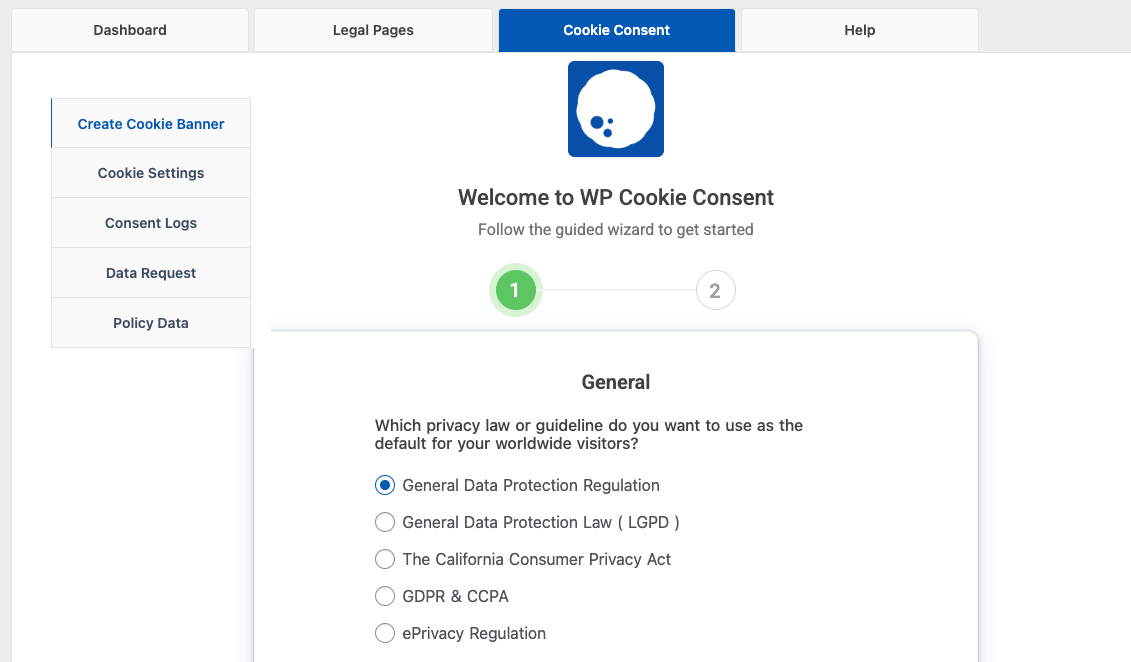
First, choose the default privacy law that applies to your worldwide visitors from options like GDPR, LGPD, CCPA, or a combination (e.g., GDPR & CCPA). Then, set up cookie banner geo-targeting to tailor the experience.
Under the Cookie Settings menu, you can fully customize and manage your cookie banner and compliance features.
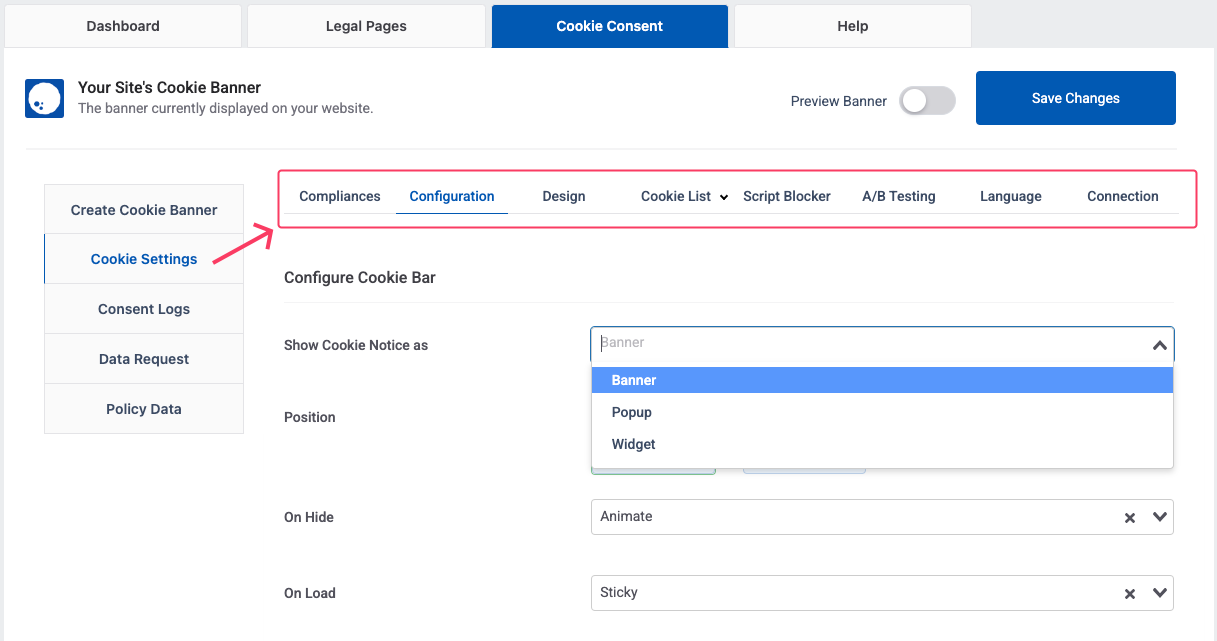
Start by configuring Compliances to align with privacy laws like GDPR or CCPA, and adjust Configuration to define cookie behavior and user preferences. Use the Design section to style the banner to match your website’s look and feel, while the Cookie List allows you to view and categorize tracked cookies.
Important: If you run ads or work with ad tech vendors, enable Google Consent Mode and/or IAB TCF 2.2 from the Compliances tab. This ensures that your consent preferences sync with advertising tools.
The Script Blocker lets you control which scripts load based on user consent, and A/B Testing helps optimize the banner’s performance. You can also set the Language for a global audience.
Step 4: Run the Cookie Scanner to Be Sure
To discover your website’s cookies, navigate to Cookie Settings > Cookie List and initiate a scan. The process is straightforward: with just one click, the system scans your website to identify active cookies. Once completed, a progress bar confirms the scan status.
This feature helps you stay informed about cookies in use and ensures compliance with privacy regulations. The scan results will help you categorize cookies and generate a proper disclosure list.
- You can scan up to 20,000 pages depending on your plan.
- Categorize cookies as necessary (Essential, Functional, Performance, etc.)
- Ensure these details are reflected in your Cookie Policy.
Step 5: Review Consent Logs & Settings
Visit the Dashboard to monitor consent logs, scan history, and legal page status. You can also:
- Export logs for audit purposes.
- Adjust banner behavior (auto-hide, scroll-to-consent, etc.)
- Set up multilingual preferences if you have international audiences.
WPLP Compliance Platform makes legal setup surprisingly simple for WordPress users. With customizable templates and built-in scanning tools, you can get compliant in minutes, not hours.
Comparison Table: WPLP Compliance Platform vs. Competitors
Choosing the right compliance platform is essential for website owners aiming to meet global privacy regulations like GDPR, CCPA, and others while ensuring a seamless user experience. This following comparison table provides a quick breakdown of verified features across five leading platforms: WPLP Compliance Platform, CookieYes, Complianz, Termly, and Iubenda.
| Feature | WPLP Compliance Platform | CookieYes | Complianz | Termly | Iubenda |
|---|---|---|---|---|---|
| Legal Templates | ✓ | – | ✓ | ✓ | ✓ |
| Custom Cookie Banners | ✓ | ✓ | ✓ | ✓ | ✓ |
| Auto Cookie Scanning | ✓ | ✓ | ✓ | ✓ | ✓ |
| Auto-Blocking Cookies | – | ✓ | ✓ | ✓ | ✓ |
| Geo-Targeting | ✓ | ✓ | ✓ | ✓ | ✓ |
| Consent Logging | ✓ | ✓ | ✓ | ✓ | ✓ |
| Multi-Language Support | ✓ | ✓ | ✓ | ✓ | ✓ |
| A/B Testing | ✓ | – | ✓ | – | – |
| WCAG Compliance | ✓ | – | ✓ | – | ✓ |
| Multi-Site Support | ✓ | ✓ | ✓ | ✓ | ✓ |
| Advanced Customization | ✓ | ✓ | ✓ | ✓ | ✓ |
WPLP Compliance Platform is ideal for WordPress users seeking an affordable, all-in-one solution with legal page generation and cookie consent. Its pricing is competitive, especially for small businesses, and its WordPress integration is seamless.
WPLP Compliance Platform: Pricing and Value for Money
Considering the combined functionality of the two plugins, WPLP delivers excellent value. Competitors often charge separately for legal documents and cookie consent solutions. Moreover, it comes with a 30-Day Money-Back Guarantee that applies to paid plans (Professional and Business), reducing risk for users trying monthly or yearly billing.
WPLP’s model is refreshingly straightforward: one platform, one license, unlimited power.

Lite Plan ($0): Outstanding value for small sites or beginners. Offers essential GDPR compliance and cookie consent features (e.g., Google Consent Mode v2, IAB TCF 2.2) for free, but limited to 1 site and 20,000 pageviews/month.
Professional Plan ($48/year): Cost-effective at ~$16/year per site for 3 sites. Ideal for small businesses with moderate traffic, offering significantly more templates, scans, and pageviews.
Business Plan ($72/year): Best value for agencies or high-traffic sites at ~$7.20/year per site for 10 sites. Unlimited scans and pageviews make it scalable for complex needs.
Yearly vs. Monthly Billing: The yearly plans are far more cost-effective than the monthly plans ($96 and $144 annually, respectively). Users committing to a year save 50% compared to the doubled monthly rates.
Final Verdict
WPLP Compliance Platform is one of the most complete and user-friendly compliance solutions we’ve tested for WordPress. It saves time, reduces risk, and helps website owners avoid legal trouble – all without the need to hire a lawyer or write a line of code.
⭐ WP Hive Rating: 4.3/5
Best for: WordPress users who want stress-free GDPR/CCPA compliance with unlimited scaling.
If privacy compliance is on your to-do list (and it should be), WPLP deserves a top spot in your plugin stack.
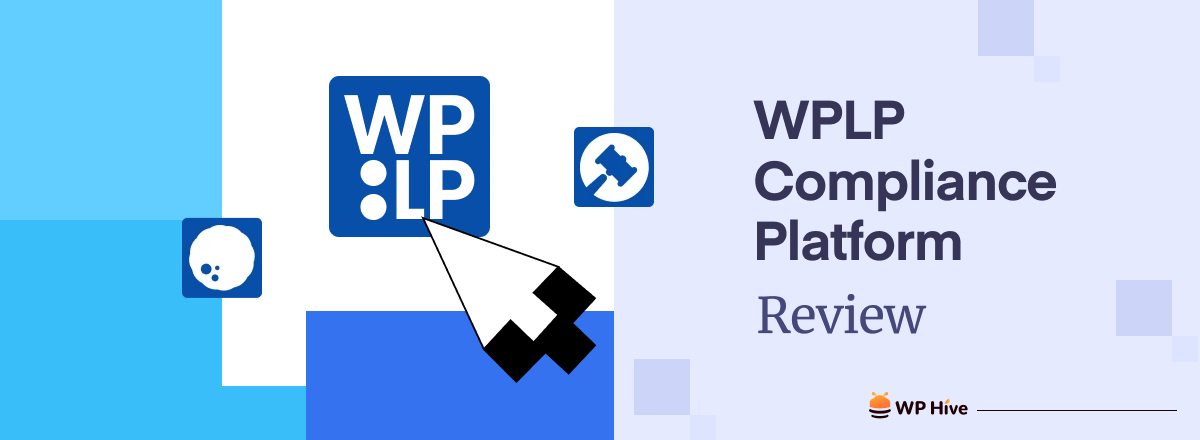

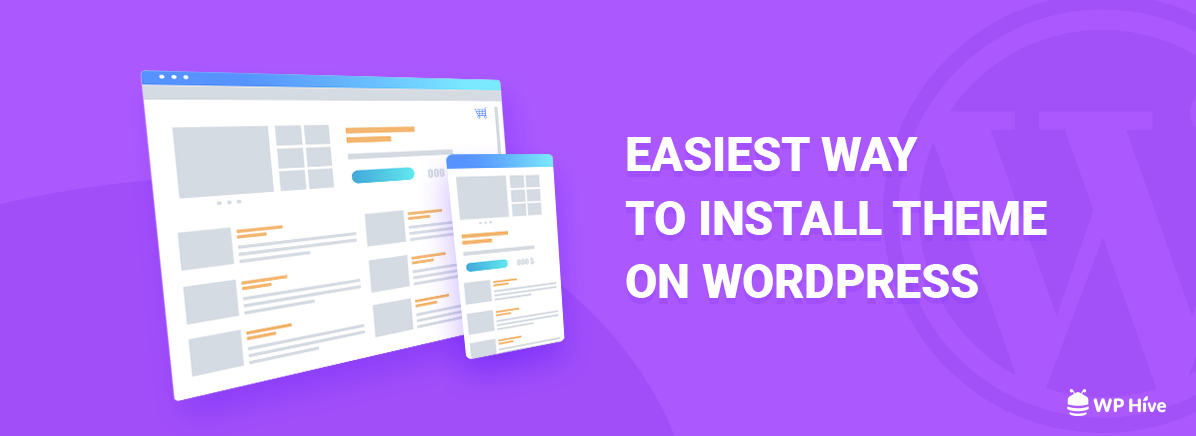


Add your first comment to this post